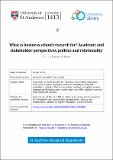Files in this item
What is business school research for? Academic and stakeholder perspectives, politics and relationality
Item metadata
| dc.contributor.author | Johnson, Steve | |
| dc.contributor.author | Orr, Kevin | |
| dc.date.accessioned | 2020-07-09T23:34:12Z | |
| dc.date.available | 2020-07-09T23:34:12Z | |
| dc.date.issued | 2020 | |
| dc.identifier | 257246922 | |
| dc.identifier | ea060f3b-048d-4ec5-8ade-8f39b5100a64 | |
| dc.identifier | 85059905796 | |
| dc.identifier.citation | Johnson , S & Orr , K 2020 , ' What is business school research for? Academic and stakeholder perspectives, politics and relationality ' , Studies in Higher Education , vol. 45 , no. 3 , pp. 557-578 . https://doi.org/10.1080/03075079.2018.1564901 | en |
| dc.identifier.issn | 0307-5079 | |
| dc.identifier.other | ORCID: /0000-0003-3024-3997/work/81797642 | |
| dc.identifier.uri | https://hdl.handle.net/10023/20228 | |
| dc.description.abstract | Through an empirically grounded analysis of contested interpretations of impact held by business school academics and wider stakeholders, we provide a political and relational understanding of research impact whereby impacts are realized through situated, relational and ongoing interactions. Our qualitative study of three UK business and management schools, comprising interviews with around 70 researchers, academic leaders and stakeholders explores conceptualizations of impact, examines the processes through which impact is achieved and considers the influence of the Research Excellence Framework (REF). The inclusion of academic leaders and business stakeholders adds value to studies that have focused primarily on academic researchers. We present a nuanced picture of the ways in which academics and business stakeholders conceptualize impact and navigate the complexity of roles and relationships in this arena. Implications for practice include the desirability of embracing different understandings of impact, creating space for generative dialogue and incorporating impact more explicitly in teaching and learning. | |
| dc.format.extent | 48 | |
| dc.format.extent | 970311 | |
| dc.language.iso | eng | |
| dc.relation.ispartof | Studies in Higher Education | en |
| dc.subject | Business schools | en |
| dc.subject | Impact | en |
| dc.subject | Management research | en |
| dc.subject | LB2300 Higher Education | en |
| dc.subject | NDAS | en |
| dc.subject | BDC | en |
| dc.subject | R2C | en |
| dc.subject.lcc | LB2300 | en |
| dc.title | What is business school research for? Academic and stakeholder perspectives, politics and relationality | en |
| dc.type | Journal article | en |
| dc.contributor.institution | University of St Andrews. Centre for the Study of Philanthropy & Public Good | en |
| dc.contributor.institution | University of St Andrews. School of Management | en |
| dc.identifier.doi | https://doi.org/10.1080/03075079.2018.1564901 | |
| dc.description.status | Peer reviewed | en |
| dc.date.embargoedUntil | 2020-07-10 |
This item appears in the following Collection(s)
Items in the St Andrews Research Repository are protected by copyright, with all rights reserved, unless otherwise indicated.

